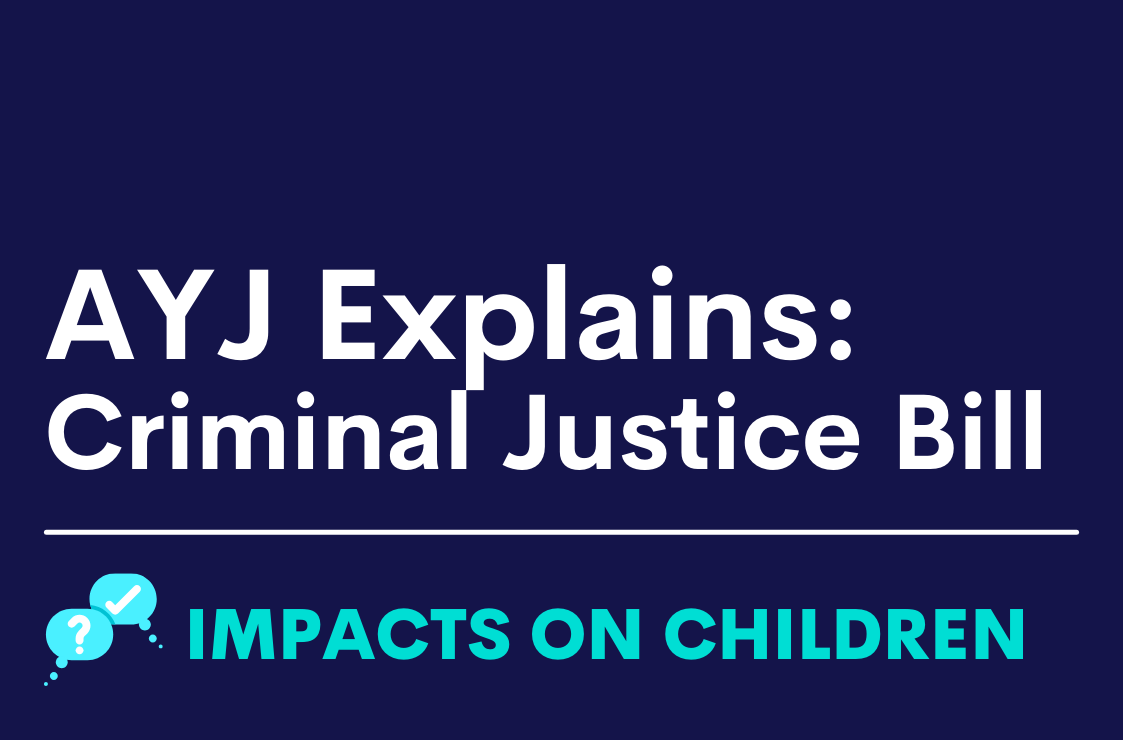AYJ Explains: Criminal Justice Bill 2023
The government has introduced the Criminal Justice Bill to Parliament. The bill contains proposals which if passed into law will impact children in, or at risk of entering, the youth justice system. We explain those here, based on information in the legislation, the government’s explanatory notes, and conversations with the Ministry of Justice.
New criminal offence of possession of a weapon with the intent to cause harm
Clause 9 introduces a new offence of possessing a knife or offensive weapon with the intention to use it in unlawful violence. Offences already exist for possessing a knife and for threatening someone with a knife, but the government believes there is a gap that this new offence will bridge. A child convicted of the offence could face a custodial sentence. If a 16 or 17 year old is convicted of two or more knife offences, the court must impose a minimum custodial sentence, unless there are exceptional circumstances.
An expanded offence of encouraging or assisting serious self-harm
Clause 11 introduces a broader offence of intentionally doing something to encourage or assist someone else to seriously self-harm.
New offences of taking intimate images and videos without consent
Clause 13 creates a range of new criminal offences to criminalise taking or recording intimate images without consent, and installing equipment to enable it
Power to compel to attend sentencing hearings
Clause 22 introduces a power for a Crown Court judge to directly order a child convicted of a serious offence to attend their sentencing hearing. Any child who refuses to attend will face a maximum penalty of a £2,500 fine. Before a court issues the direct order, it must first consult with the child’s Youth Offending Team.
New statutory aggravating factor for those involved in grooming
Clause 23 will mean courts would consider any nature of grooming as an aggravating factor when sentencing for specified sexual offences committed against children.
New statutory aggravating factor for murders
Clause 24 will mean murders connected to the end of a relationship, or where the victim was trying to end a relationship, will by subject to a new statutory aggravating factor, meaning courts should impose a more severe sentence.
Expanding Multi-Agency Public Protection Arrangements (MAPPA)
Clause 30 means those who have received certain sentences for controlling or coercive behaviour will be automatically subject to the MAPPA regime – a mechanism for agencies to work together to manage people deemed a risk to the public.
Expanded orders and new powers aimed at tackling ‘anti-social behaviour’
Clause 67 lowers the age limit for a Community Protection Notice (CPN) from 16 to 10 years old. CPN’s are designed to stop a person committing anti-social behaviour, and are issued if behaviour is persistent, unreasonable, and has a detrimental effect on quality of life. Failing to comply with requirements of a CPN is a criminal offence, and Clause 70 increases the fixed penalty notice that can be given for a breach. Clause 72 gives local policing bodies a new power to make recommendations to their local Community Safety Partnership (CSP) around the formulation and implementation of crime and disorder strategies, and around how the CSP supports the policing body’s delivery of its policing and crime objectives.
What happens now?
The bill was introduced to Parliament on 14th November 2023 and is due its second reading - where measures in the bill will be debated in the House of Commons - on 28th November. Parliamentarians and organisations working with and on behalf of those that will be affected now have the opportunity to scrutinise the proposals and suggest changes.


